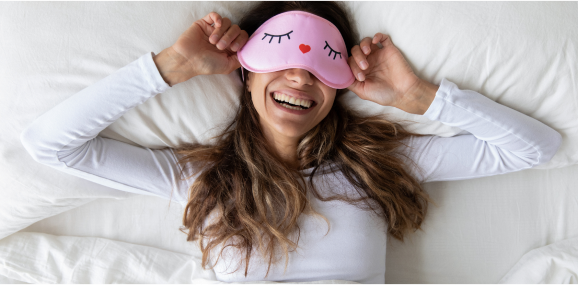It might surprise some to know that no one actually “sleeps through the night.” Everyone wakes up during the night, whether they realize it or not.
Waking up in the middle of the night is actually pretty normal. In fact, most of us wake up multiple times a night, sometimes within the same hour.
We don’t really notice these micro-awakenings at all — they can last seconds. For example, it could be something as simple as changing positions during the night. We’re awake for a brief second, then back to catching zzzs.
But what about those times when we know we are awake, those observable wake-ups? Some find it difficult to fall back asleep after these episodes.
Here we share some tips and tricks to help get you back to sleep.
Why We Wake Up at Night
Most of us have experienced it — waking up at 2 a.m. for no good reason. Waking up in the middle of night once in a while is no big deal. In fact, brief periods of arousal, or micro-awakenings, are completely normal and are part of the normal sleep process.
However, waking up and staying awake regularly is no fun, not to mention exhausting, and it can take a toll on your sleep schedule. Sleep is a health imperative. Constant or regular disruptions in our sleep can have some detrimental effects on our hormones, energy, mental health, and physical health.
But why does it happen? What causes us to go from dreamland to wide awake? Well, there can be many reasons for this, ranging from behavioral factors and habits to outside influences and environmental factors.
Regardless of the exact cause, it is some sort of disturbance during the sleep cycle.
Disturbance in the Sleep Cycle
Recommendations put out by the National Sleep Foundation states that adults should be getting roughly seven to nine hours of sleep every night. This is considered “normal sleep” for healthy individuals. Babies, children, and teenagers require more.
While seven to nine hours of sleep is ideal for adults, roughly one-third of U.S. adults report sleeping less than seven hours a night on average. Some of the reasons for not getting adequate sleep is the issue of waking up in the middle of the night.
Sleep is not a uniform process, it actually involves multiple steps. As we sleep we cycle through periods, or stages, of light sleep, deep sleep, and rapid-eye movement (REM) sleep. The average adult progresses through these sleep stages around four to six times a night.
The most restorative sleep occurs during Stage 3 of the sleep cycle, this is known as deep sleep or slow-wave sleep. If we are constantly waking up during this stage, we can expect fatigue, issues with our mood, and more.
Poor Sleep Hygiene and Habits
Typically, these disturbances in the sleep cycle are self-inflicted and are avoidable. For example, drinking loads of caffeine before bed is never a good idea if sleep is on your agenda.
Here are some other factors that could have you waking up at night.
- Eating too much right before bed — digestion kicks in later and could wake you.
- Caffeine, including coffee, soda, tea, and energy drinks.
- Too much scrolling on a phone, laptop, or e-reader; blue light from electronic devices can disrupt the sleep-wake cycle and impact melatonin.
- Erratic and irregular bed and wake up times.
- Anxiety and stress, some of the biggest thieves of sleep.
- Unaddressed issues with insomnia, restless legs syndrome, or sleep apnea
- Use of alcohol
How To Fall Back Asleep: Tips and Tricks
Falling back asleep after waking up is difficult for some, especially if there are underlying health issues or sleep disorders at play. But, these tips and tricks could get you catching zzzs again in no time.
Don’t Fret
Being unable to fall back asleep can be annoying, but you can’t let it cross the threshold to full blown stress. Stress and anxiety can make sleep difficult.
Stay calm and find a simple relaxation exercise that works for you.
It could be meditation, a breathing exercise, taking deep breaths, or muscle group relaxation — like progressive muscle relaxation.
Resist the Urge to Reach for the Phone
When many of us have trouble falling back asleep in the middle of the night we get the urge to grab the phone or tablet. Maybe we want to check the weather or scroll through our social media feed. But, we must resist the temptation.
Blue light from electronics can make it even more difficult to fall back asleep.
Don’t Be Afraid to Get Up
Too many people think they have to lay wide awake in bed after they wake up in the middle of the night — breathe easy, there is no law that says you must.
In fact, if you find yourself still awake after 20 minutes it's completely fine to get up for a bit.
Move to another room and find something relaxing and distracting to do until you feel sleepy again.
Do Something Boring
If you have intentions of going back to sleep it would be best to avoid things like intense exercise.
Find something boring to distract yourself with, a boring task to occupy your mind.
It could be reading a book or article, but pick something dry. If all else fails, you could always count sheep.
Listen to Relaxing Music
If reading a boring book isn’t doing it for you, you could also turn on some relaxing tunes to ease tension.
Relaxing music or a white noise machine could help calm and soothe your mind, helping you fall back asleep.
Plus, it may help block out unwanted sounds that seem to capture your attention when trying to fall back asleep.
Try Some Breathing Exercises
Falling asleep involves the ability to relax, easier said than done for many people. Performing some sort of breathing exercise could help calm you and your mind, helping you get relaxed enough to fall back asleep.
One popular technique is known as the 4-7-8 breathing technique. Here’s how it works:
- Empty your lungs of air.
- Breathe in through your nose for 4 seconds.
- Hold the breath for a count of 7 seconds.
- Exhale through the mouth forcefully, making a whoosh sound by pursing the lips, for 8 seconds.
- Repeat this cycle up to 3 or 4 times.
Give Sleep Pod a Try
If anxiety is one of your issues when it comes to falling asleep, the Sleep Pod might help you in terms of relaxation.
Using Deep Touch Pressure Stimulation (DTPS), the Sleep Pod helps reduce feelings of anxiety by providing gentle compression throughout the night.
Cultivating Better Bedtime Habits
These tips and tricks can certainly help you if you’re having trouble falling back asleep, but it all starts with cultivating the right habits and routines at bedtime. One of the first steps when it comes to creating healthy sleep routines is maintaining consistency.
> Consistent sleep and wake schedules.
This consistency starts with your sleep and wake schedules. Irregular sleep patterns are one of the primary factors when it comes to poor sleep. It has a habit of throwing off your sleep-wake cycle and throws a wrench into your circadian rhythm. Try to wake up and go to sleep at the same time every day — even on the weekends.
> Create a calming bedroom environment.
Many people overlook the importance of the bedroom environment when it comes to going to and staying asleep. This involves everything from the mattress and pillows, to the temperature and lighting.
A cool, dark sleeping environment usually makes for the best. But, it’s all about your comfortability. Limiting light exposure before bed, keeping your mattress firm, and sleeping in a cooler temperature may make for a more well-rested morning tomorrow.
> Create a pre-bed routine.
The point of this is relaxation. You need to find something that helps you wind down. Typically, this would be about 30 minutes before bed. The possibilities are endless. It could be a nice book, a warm bath, or aromatherapy — it’s totally up to you.
Conclusion
Sleeping through the night rarely happens. Most people wake up multiple times during the night, even when they don’t realize it.
But, waking up and staying up is no fun. It can put a real damper on the night — and day.
Thankfully, there is hope. Many of these tips and tricks can help you cultivate the relaxation you need to get you recapturing those zzz’s, but if you suspect a sleep disorder, you should consult your physician or a sleep medicine specialist.
Sources:
EEG Arousal Norms by Age | NIH
The Extraordinary Importance of Sleep | NIH
Sleep Statistics - Facts and Data About Sleep 2021 | Sleep Foundation
The Color of the Light Affects the Circadian Rhythms | NIOSH

































500,000+ happy customers